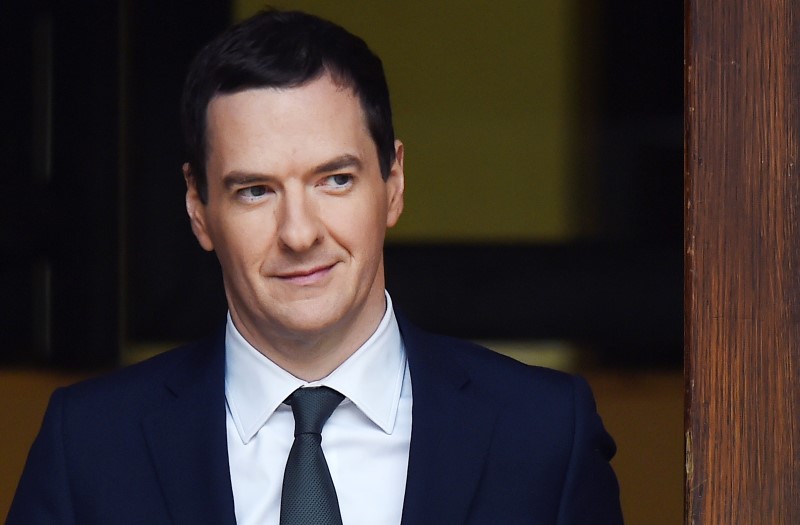By David Milliken
LONDON (Reuters) - Chancellor George Osborne warned on Thursday that the economy faced a "dangerous cocktail" of threats from abroad and he urged against complacency after two years of solid growth.
Osborne, whom Prime Minister David Cameron has named as a possible successor, said in a new year's message that Britain faced headwinds from slower growth in China, Brazil and Russia, tension in the Middle East and stock market falls.
"The economy has slipped down the list of many people's everyday concerns. But the biggest risk is that people think that it's 'job done'," Osborne said, in extracts of a speech he will deliver later on Thursday in Cardiff.
Britain has been among the fastest-growing rich economies for the past couple of years. But Cameron and Osborne often stress the dangers faced by the recovery as they seek to make the most of a reputation for economic competence among voters.
Osborne remains several years away from his main objective of turning Britain's big budget deficit into a surplus. In November, he dropped planned cuts to welfare spending under pressure from within his own party and the Labour opposition.
More recently, business surveys and a downgrade to official growth numbers have suggested the outlook is more fragile than thought a few months ago. The start of the year has seen a big fall in global share prices and an 11-year low in oil prices.
British share prices tumbled nearly 3 percent on Thursday, and have lost more than 5 percent since the start of the year.
"This year opens with a dangerous cocktail of new threats," Osborne said. "We are only seven days into the New Year, and already we've had worrying news about stock market falls around the world, the slowdown in China (and) deep problems in Brazil and in Russia."
Osborne made no mention of the referendum on European Union membership that Cameron has promised to hold before the end of 2017 but which many analysts expect to take place as early as June. They say that could cause businesses to delay investment.
The British Chambers of Commerce said on Thursday that manufacturing exports stagnated late last year for the first time since 2009, and expansion in other areas weakened too.
"This fits in with other signs that, after solid growth in 2013-15, the UK economy is slowing quite markedly," Citi's chief UK economist, Michael Saunders said.
Some economists are now moving away from earlier predictions that the Bank of England would start to raise interest rates in the first half of this year, and British government bond yields are hovering around three-month lows.
Many economists now say the Bank of England looks unlikely to start to raise interest rates in the first half of this year.
The BCC also warned of a two-tier economy where growth relied on consumer demand and rising house prices, something supported by other data released on Thursday.
Mortgage lender Halifax said house prices in December had risen by 9.5 percent over the year, while official figures showed services companies' profitability was at a record high but manufacturers' profits were the lowest since early 2012.
Osborne said the big fall in oil prices was good for most British consumers and businesses but would hurt oil and gas output and investors who had lent to the sector. Tensions between Saudi Arabia and Iran were also a worry, he said.
Since becoming Chancellor in 2010, Osborne has made reducing Britain's large budget deficit his priority, and more than halved it to just under 5 percent of gross domestic product during his first five years in office.

But public borrowing during the current financial year has come in above forecasts, raising doubts about whether Osborne will meet his most immediate fiscal goals.